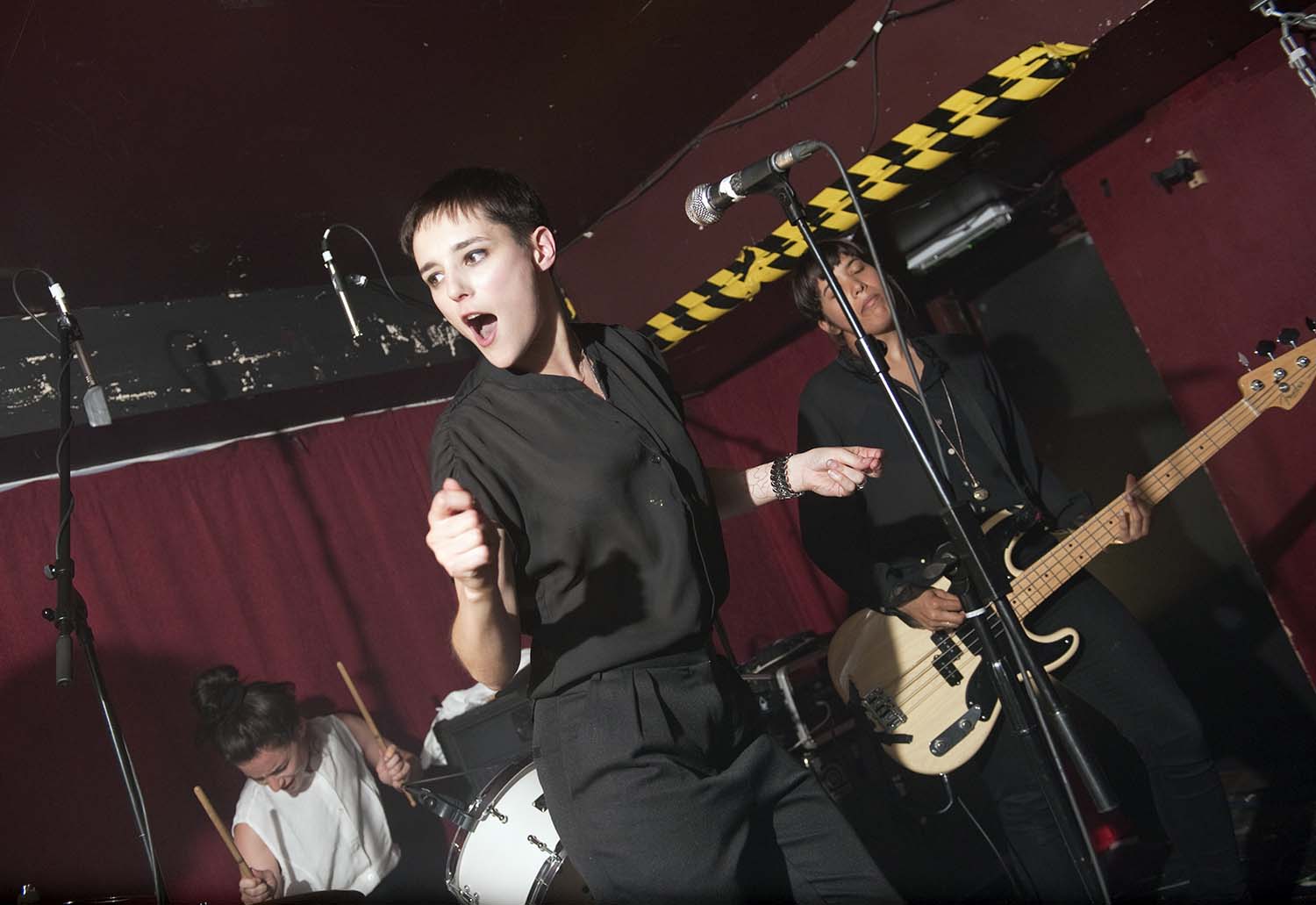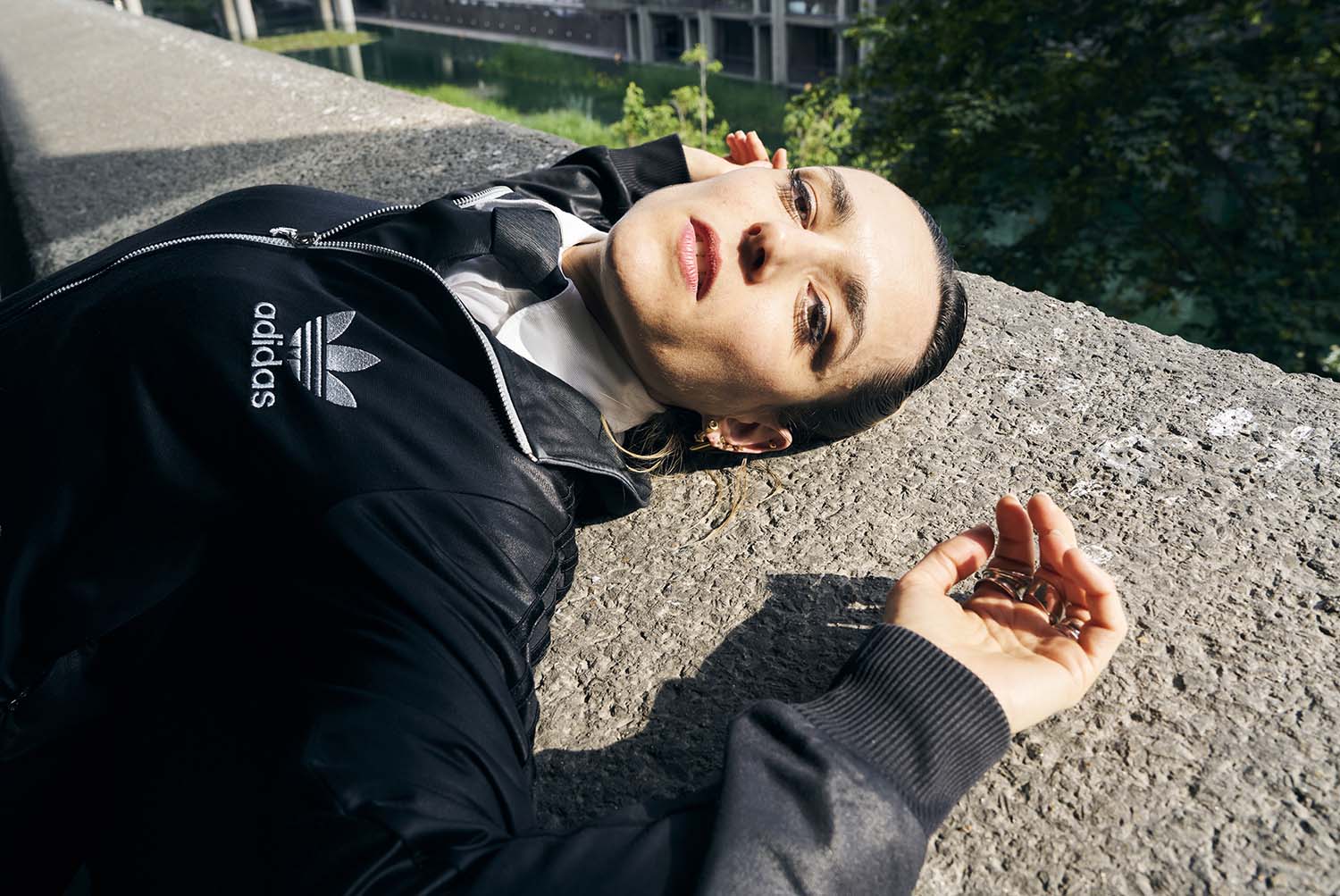Portrait by Suki Dhanda
In a green garden hidden within the concrete of London’s Barbican centre, Jehnny Beth sits on a bench. She’s talking about making music, and other things too.
“I feel like I’m told constantly that things are difficult to make,” she says. “So you stop yourself, you think, ‘I have to pay someone to do it.’ Like, colour photography, people say, ‘Oh, colour film, it’s really hard to develop.’ But if you can count, if you can measure, if you can wait and be patient, or be a little bit crafty, then you get somewhere.”
She sits up straighter.
“And with music, you can’t be surprised that it speaks back to you,” she says. “It has its own identity, its own life and desires. It’s like Data in Star Trek, do you know that? It’s an entity and it has rights. That’s how I see music. Everything’s already there. You just have to listen.”
Beth is interesting, and intense. Hard to look away from, with her hair slicked back into tight plaits, white shirt, black tie under slashed black jumper, black suit trousers and trainers. Like a sheathed scythe amid this abundant English greenery, like she means business.
Since 2011, when Savages, her band with Gemma Thompson, Ayşe Hassan and Fay Milton, launched themselves sneering and rabid into a tepid indie scene, Beth, real name Camille Berthomier, has demanded attention. Abandoning the band in 2016, she’s been involved in a variety of projects, singing with Gorillaz, with Julian Casablancas. In 2020, she released her first solo album, To Love Is to Live, an eclectic affair that featured Cillian Murphy reading her poetry, among other collaborations. It was accompanied by C.A.L.M. (Crimes Against Love Memories), an erotic book, produced by her and her long-term partner and collaborator Johnny Hostile. In 2021, she followed it up with Utopian Ashes, an album of duets with Bobby Gillespie.
More? Alongside her music, she created, hosts and co-produces a TV show, Echoes with Jehnny Beth, a little like a French Later, where bands play and she talks to them. And she acts: she was in the well-received Astrakan and the multi-award-winning Anatomy of a Fall. Différente, directed by Lola Doillon, in which she stars as Katia, a young woman with autism, was released this month; she’s also in a Netflix series with Suranne Jones, Lucian Msamati and Julie Delpy that will come out in the autumn.
“It’s a political thriller,” she says. “Do I play a spy? I cannot say.”
But with Beth, you feel everything is rooted in her music; and all her records, she says, are created from a feeling, an urgency, “an itching under the skin”. Such a feeling “has to prevent me from sleeping, really bubble inside me”, she says. “Then I know I might have something to say.”
Newsletters
Choose the newsletters you want to receive
View more
For information about how The Observer protects your data, read our Privacy Policy
The itching for her latest LP, You Heartbreaker, You, came from her support slot for Queens of the Stone Age, touring the US in 2023. In between, Beth and her band would play at hardcore metal festivals, and she loved the passion of the crowds.
“They were speaking my language, they accepted me from song one,” she remembers. “And suddenly this energy, this Jehnny Beth energy, woke up from its sleep.”
You might recognise that particular energy from Savages: a confrontational, physically committed, wild ferocity. Anyway, Beth kept that feeling inside her and then, when the tour was finished, wrote and recorded the album in a matter of months with Johnny Hostile, real name Nicolas Congé. She and Hostile have been collaborators for 20 years, since they were in a Kills-inspired band called John and Jehn, which gave them their stage names. These days, Hostile, like Beth, has a severe rock look. When you see pictures of them when they started out, they appear much softer: Hostile has razor cheekbones and a huge smile; Beth, a sweet bowl cut.

Beth performing with Savages in 2012 in Glasgow
The length of their relationship – they are partners in all senses, but, says Beth, she would never use the word “romantic” about their connection – means that, when it comes to work, Beth and Hostile “need to be able to deconstruct and construct things, and to talk and to set a few rules”. Which is fine, because Beth loves rules and, especially, a manifesto.
“Since Savages, I always wrote manifestos,” she says. “I adore them. It’s a way for me to frame the creative process.”
You can find her manifestos, usually, somewhere within the artwork for each album. And she’s expanded them into her everyday life; during lockdown, she started writing lists – observations, mottos, ideas – which she regularly publishes on her Instagram page under 20 Things I Noticed.
These lists vary between everyday observations and life-enhancing rules, and there are some great little soupçons, such as “you long for someone who knows how to hear what you do not say, but maybe you should learn how to speak instead, or sing”. And “the truth will set you free but first it will piss you off”. And “I think I would want my legacy to be: listened and learned, did honest work, excellent emergency contact”.
With You Heartbreaker, You, the manifesto Beth and Hostile came up with gave them a creative structure to make the album on their own, without help: the whole process, from songwriting to performing to production to artwork to video. That’s why, says Beth, the manifesto started with the encouraging “nothing is as complicated as you think it might be”.
She sends me the manifesto after we speak, their 20 rules. Number 5 is interesting: “Music: listen, react, leave, forget, come back. Repeat.”
This is about Beth and Hostile deciding they weren’t allowed to bore one another: “We had to be gentle to each other, but if we were bored, we delete. I would spend all morning on a vocal, and he’d come and listen and be like, ‘I’m bored’, and I have to delete. It’s the game. And I really enjoy that.”
Their create-delete-create-repeat took place in their home in the countryside south of Angoulême. A house with a recording studio, an iron forge (Hostile makes metal sculptures), a darkroom, a place to make silk screen T-shirts, Hostile’s grandmother’s sewing machine, a scanner: “A place where we just wake up and be artists, and then we might cook some food, and then we go back to the studio. It’s amazing.”
It sounds it: a bucolic French artistic idyll, “a sanctuary”. So you might be surprised by the intensity of the resulting album’s sound. It’s noisy, dense, wild: think Nine Inch Nails, or PJ Harvey, or, of course, Savages. The video for the first single, Broken Rib, sees Beth as an office worker, in skirt suit, losing it among the rows of desks and computers. She’s magnificent.
The title of You Heartbreaker, You was inspired by some graffiti she saw in London. She was walking with Hostile and they came across a car, covered in concrete, on which someone had written: “YOU CHEATING BASTARD, I’M PREGNANT WITH YOUR CHILD.”
“So violent!” says Beth delightedly. The image is recreated for the LP cover. She scrawled its title on her own car and it was transferred to a Hostile photo of her face. She says: “It felt like it was the core of what it is to be human, a very raw representation of it. And I feel that my music is a raw representation of what it is to be human as well.
“Love comes with conflict and pain. We’re not as evolved as we think in romantic relationships, I think we’re still at a really prehistoric stage. Like cavemen. I’m sure ‘You cheating bastard, I’m pregnant with your child’, is drawn in a cave somewhere.”
This is not to say that she’s talking about herself and Hostile; she’s spoken about their having an open relationship in the past. To me, she says: “The attraction of C.A.L.M. was to deconstruct the idea of the couple, which I think is the last taboo. Society presents one model: legally, financially, everything works better if you’re a couple. I think young people are trying to re-evaluate that dynamic. But I feel very distant from that work now. It’s detached from my reality as well.”
Deconstructing the couple is the last taboo... the young are trying to re-evaluate that
Deconstructing the couple is the last taboo... the young are trying to re-evaluate that
Whoever or whatever she is thinking about, on You Heartbreaker, You, there’s not much let-up. At one point, Beth is singing (screaming) about refusing to take on other people’s pain. She says: “Well, I can’t feel your pain and you will never feel mine. I try, but it’s the same with pleasure. You can describe it to me, but I will never feel at that same instant what you feel.”
That sounds a bit unempathetic. “Empathy is a construction – a good one, because we need it,” she says.
All this rawness and rage and inability to walk in others’ shoes might make Beth sound tough, but in real life, perched straight-backed on the bench, leaning in, keen to make herself understood, she’s the opposite: very human. Before our interview, several people had warned me that she can be difficult (there’s an old Guardian interview where she’s dismissive and brusque), but, as we talk, I find myself feeling protective of her. Beth has an artist’s focused desire that her work be properly understood, received in the way it’s being offered. It makes her vulnerable.
There’s a song on the album called No Good for People with the lyrics: “I’m no good for people, I wear them down… I am too critical.”
“Well, clearly, I’m no good for people,” she says, smiling. “I saw a scene in True Detective where Matthew McConaughey says that. And it coincided with how I feel and how Johnny feels sometimes as well. I say things that can be upsetting to people. But I’m just trying to help.”
Beth grew up in Poitiers, a clever, hard-working, middle-class child. Her parents were teachers; her father started a drama school for teenagers and young adults. She says: “He wanted young people to leave, to escape, or, if they had the talent, to work on it, to use it to become someone.” (Which is, of course, what his daughter has done.)
She studied jazz singing from the age of eight, spending every Saturday with her singing teacher’s family, learning not only to sing and to play piano, but about the world of jazz, “greats like Chet Baker”. She thought she might be an actor (she played Peer Gynt in a production of Henrik Ibsen’s play when she was young) but, as she grew up, the constraints of bourgeois French society started chafing, and music seemed to offer of a way out. Previously, she has said that she felt her bisexuality couldn’t be expressed in a repressed Catholic society.
So at 15, Beth went to London, staying with friends of her jazz teacher in Wood Green. The visit whet her appetite and after university (she studied English, to aid her escape) she moved back there with Hostile, paying her way by teaching French, first in a school in Enfield, then privately, to posh children. (“They were very depressed,” she recalls. “Nobody was really listening to them.”)
“All my twenties in London were a moment of transformation,” she says. “To me, I had no father, no mother. Even my French identity I erased. I believed that, to be an artist, you have to have no roots. It’s not what I feel today, but I did at the time. I needed to feel free, uprooted and liberated from my education, my conditioning, my origins.”
She has changed since her twenties, of course; moving back to France, appreciating her parents. She gave up alcohol in 2013 (“I can hear the audience. I couldn’t hear it before. I feel grateful for that”); she does boxing in Paris (on her Instagram stories, she put up a picture of her nose bleeding from a punch); she DJs (she’s doing a set at Glastonbury: “I’m going to play remixes of songs off the album that are not released yet”). And, every day, she writes her notes.
“I think writing is looking,” she says. “The world is filled with things that are waiting for you to write about, and words free them. It’s the same with music. I always think that everything is there. The music does its own work. You don’t need to fabricate it. It’s just we don’t always have the concentration, the attention, the focus, and we spend our lives being distracted… being present in the present is the most valuable tool you can have.”
She leans forward again.
“I approach everything with the intention of not boring people. I don’t want to put that on anybody. I know how it feels to be bored.”
Jehnny Beth’s album You Heartbreaker, You (Fiction) is out on 29 August
Photographs by Suki Dhanda, Ross Gilmore/Getty

